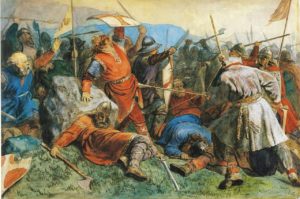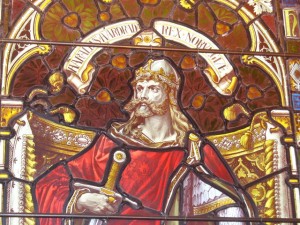
By many accounts, the blame for Harold Godwineson’s failure to stop William’s invasion can be laid on his brother Tostig’s shoulders. What might have started as sibling rivalry seems to have evolved into jealousy, then resentment turned into recrimination, and finally a desire for revenge seems to have swept aside all other considerations…even the safety of the country.
By most accounts, Tostig was likeable if headstrong; he knew what he wanted but could be overzealous in enforcing his will. He ruled the difficult Northumbrians for ten years before things got out of hand, and it is probable that the final uprising was due to his new taxation measures, partially to pay for the Welsh campaign of 1062. Tostig had participated in support of his brother Harold, but the campaign was of no real interest to the Northumbrians who probably resented having to fund it.
The end of his rule was violent and final, and Tostig was horrified that his brother Harold was unwilling to support him. Accusations of treachery were tossed about, and Tostig left the country vowing revenge. In a previous post I followed his movements for the next year, and by the time they met face-to-face on the battlefield, the brothers were irreparably sundered.
However, I’m not so sure that Tostig is the total bad guy he was portrayed as. According to Snorri Sturluson in Heimskringla, at Stamfordbridge when Harold Godwineson approached the Danish army (in disguise) to offer his brother all of Northumberland and a third of the kingdom to share, Tostig turned him down. “That is an offer different from the one of last winter, when I was shown contempt and hostility. If it had been made then, many a man would be alive who is dead now, and the king’s power in England would stand on firmer ground…” He said that he would not have the Vikings claim that he forsook Hardrada to join his enemies, and that “Rather shall we all resolve to die with honor or else win England and victory.”

This is also the moment when Harold offered to give Hardrada, in turn, “seven feet of English soil or so much more, as he is taller than other men.” The Norwegian King apparently did not take offense, because as the messengers were riding away, he asked Tostig “Who was that man who spoke so well?” When Tostig told him it his was brother Harold the King, Hardrada chided him for not revealing the stranger’s identity when he would be such an easy target.
But Tostig would not have it so: “I saw that he wished to offer me peace and much power and that I would be the cause of his death if I told who he was. But I would rather that he slay me than I him.” Sounds to me more like a man resigned to his fate rather than a vicious betrayer. Hardrada turned to his men and said, “A little man that was, and proudly he stood in his stirrups.”
Harold Hardrada fell first with an arrow in the throat, and Tostig Godwineson raised the King’s banner over him while both sides reformed their lines. Once more, Harold Godwineson offered a reprieve to Tostig and all Vikings who were still alive, but “the Norwegians all shouted together and said they would rather fall one upon the other than accept quarter from the English…” And that is the last mention Snorri gives of Tostig.
It’s very unpopular to defend Tostig Godwineson, but I keep wondering if he was a bit misunderstood. He always seemed to be in his brother’s shadow, and his misguided attempt to come out on top can be appreciated by many younger siblings who are not the favorite child.
Johnny H says:
Good post, Mercedes.
Tostig had always been loyal to his older brother, Harold, and we never hear of any inter-family squabbling between them before 1065, when Tostig accused Harold of not supporting him?
They even campaigned through Wales together in 1063 in a two-pronged attack against Gruffydd ap Llewelyn?
I think Harold was merely trying to steer England through a troubled period when dangerous enemies threatened? He chose to back the Northumbrian rebels over Tostig in late 1065, had he not, Earls Morcar and Edwin would have led the north and Mercia against Wessex in a destructive civil war when Norway and Normandy looked at invasion?
Mercedes Rochelle says:
Do you think Morcar and Edwin had the resources or the nerve to mount an invasion? They seem singularly incompetent to me, although maybe that’s an unfair judgment considering they could never have measured up to Harold’s example. Regardless, I suspect Harold didn’t feel he had much choice; the Northumbrians were a difficult bunch to control, I reckon!
Johnny H says:
I think that the brother earls were way too young and inexperienced for battle against anyone, though they may have been at Hastings before pulling back to London after Harold’s death?
They were only in favour with Northumbrian nobles as they were not southerners, as Tostig was, and it’s clear that they felt unable to face Harold directly (despite the rivalry between the houses of Godwin and Leofricson) during the 1065 revolt or after Edward’s death in January 1066.
Their desire for independence shows in their rash choice to face Hardraada and Tostig at Fulford, which Harold massacred later.
Harold made a good political move in spring 1066 to negate the ‘wild and turbulent’ northerner’s anger and distrust by meeting them and offering marriage alliance to the brother’s sister, Eadgyth (Gruffydd’s widow)? This, he might have thought, unified them (nominally anyway) and militarily secured the north against any viking raids leaving Harold free to expect William in the south.
Joe Robinson says:
I am interested to know what the source is for the presence of the Northumbrians at Hastings? Harold would appear to have left them behind when he marched south. I haven’t read this anywhere else. Please help.
Mercedes Rochelle says:
Hi Joe, thanks for the comment. Actually, Johnny H made the reference to Hastings in his comment, but alas, his blog is no longer active and I don’t know where he got the information from. It is my understanding that Harold expected Edwin and Morcar to join him at Hastings and even tarried in London six days waiting for them. I believe they were a no-show. This is according to Edward A. Freeman’s “History of the Norman Conquest of England” Vol. 3 Page 439.